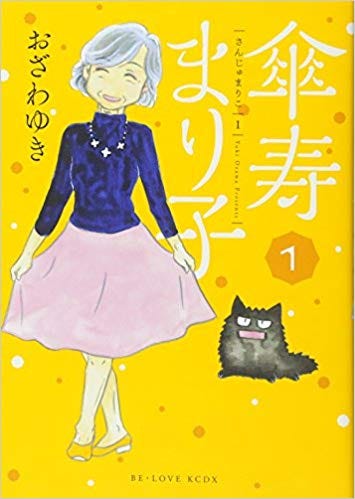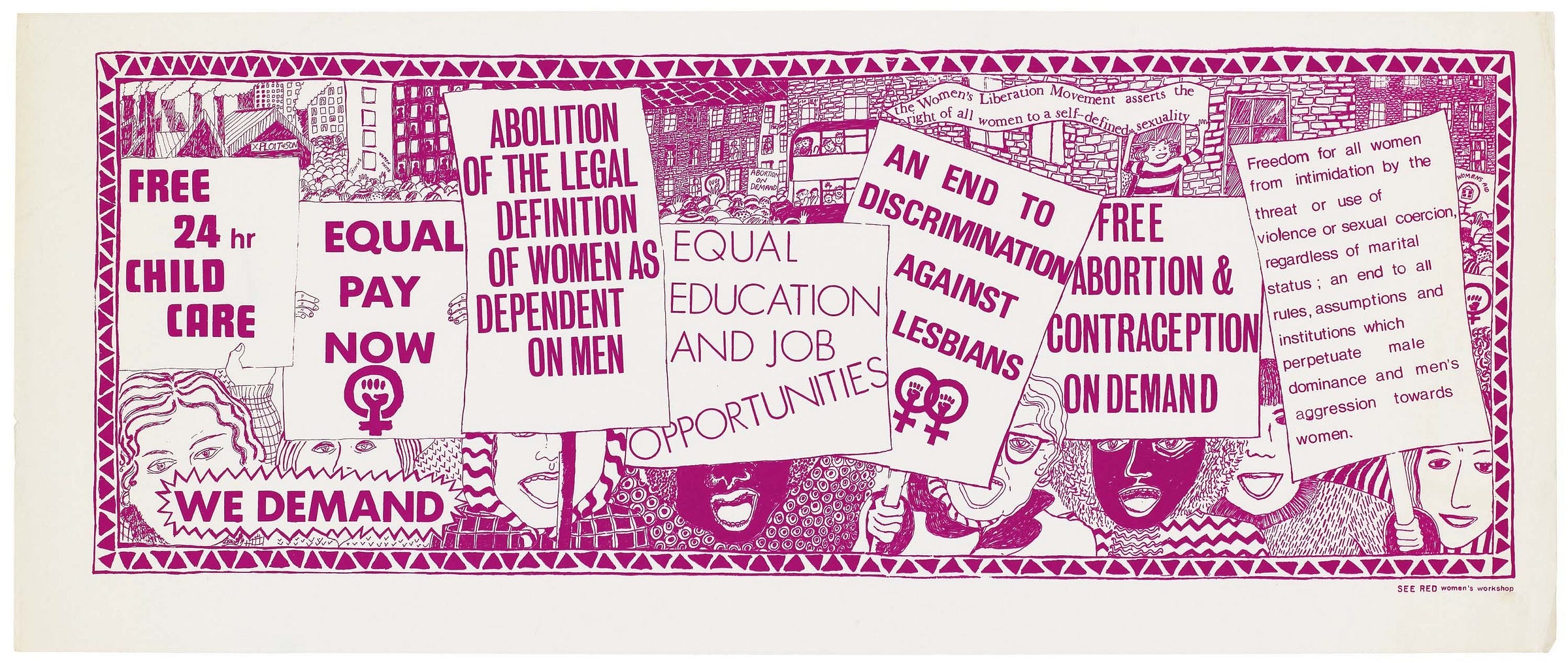It's never too late
Takino Fumie, woman extraordinaire
Yesterday was International Women’s Day. In Japan - a country where everything has its own special day (Cats’ Day, for instance, is 22 February, while Banana’s Day is 7 August - very few people know about it. However, I grew up in Italy, where 8 March is a huge affair, with women marching in the streets and men giving them mimosas. It’s an important day. So I’m devoting today’s post to a remarkable woman I have the privilege to know. This piece originally appeared in a special issue of French magazine Zoom Japon devoted to manga about old people.
Today she is not wearing the usual pink tank top, gold-hemmed mini-skirt and white leather boots, but a simpler black-and-red dress. She hasn’t even brought along her golden pom-poms. Today, after all, it’s not a training day. Takino Fumie, 87, is the founder and head honcho of Japan Pom Pom, a cheerleading team exclusively made of elderly ladies. The second oldest member is around 80 and more than half are over 70.
“I started Japan Pom Pom in 1994, when I was 62, after reading a book about a senior cheerleader team in the US,” she says. “We only have two rules: you have to be at least 55 years old, and you have to be good looking… or at least have confidence in your physical attributes. I know that at 55 one doesn’t really qualify as a senior but I just followed the American team’s example. We perform at such places as nursing homes, but I mainly do this for me; because it makes me feel good about me.”
Takino was born in Hiroshima and grew up in Hyogo Prefecture, near Kobe and Osaka. “That’s why I’m a little strange (laughs). At least that’s what Tokyoites think.”
Indeed, Takino is a pretty unique lady and the right person to talk about the new wave of manga featuring elderly protagonists. Not only she is a manga reader in her late 80s, but she also has a Master’s degree in gerontology from the University of North Texas. “I took up gerontology because I wanted to know how our body and mind change when we get old,” she says. “Japan is the world’s fastest-aging society and we have the longest life expectancy, and yet even now there’s only one gerontology course in Japan. Everything in Japan is about geriatrics (i.e. the treatment of existing diseases in the elderly) but nobody seems to care about the psychological, social and cultural aspects of aging.
What people – especially younger people – must understand is that getting old doesn’t necessarily mean getting sick. Aging is not a disease.”
Though not an avid manga fan, Takino often reads comics she gets from her two children. “I’m afraid I don’t really keep up with the latest trends,” she says. “I mainly read shonen (young boys) manga – Atom, the baseball story Star of the Giants, and Oishinbo, a manga about cooking – but my favorite titles are Sazaesan and Touch, another popular manga about baseball and high school romance. Another comic I enjoy a lot is The Japanese the Japanese Don’t Know, which revolves around elements of the Japanese language such as word origins and proper uses.”
For this issue I asked Takino to read a couple of manga, Sanju Mariko and Yuugure e. The former one is the story of a youngish-looking widow in her 80s who shares the same place with her son’s family. Feeling that her presence is unwelcome, she decides to leave and start a new life on her own. This manga seemed to appeal to Takino, herself a very independent woman. “My marriage was not a lucky one,” she says. “We had problems from the start. He was a serial cheater, and was indifferent to both our children and me. But more than his womanizing I resented his laziness. I would have divorced him right away but I thought a separation would have a bad effect on the kids so I put up with him until they finished school.”
Takino eventually got a divorce at 52, and one year later went to America to study gerontology. “At that time I made a resolution: I would enjoy the rest of my life to the full, no matter what,” she says. “I also wanted to prepare myself for when I got old, and learn how to stay healthier and be happier for longer.”
Takino is sympathetic with Mariko’s decision to leave her son’s family. “I’ve never believed in multi-generational families especially when the parents get old,” she says. “Many people in Japan still take it for granted or at least hope their children will take care of them. I understand being alone is hard, but I’m against it. Maybe taking care of your elderly parents was feasible in the past when people died younger but you just can’t ask 60- or 70-year-old persons to look after their 80/90-year-old parents. It’s so tough both physically and mentally, no wonder they get depressed, sick, or end up killing their parents. After hearing one sad story after another you start wondering, what’s the use of living with your married children when you end up hating each other?
“I want my children to be happy, and I don’t want to be a burden on their life, so I’ve been very clear with them. I said, don’t worry about me, I’m going to manage by myself. Just don’t expect to get any money when I’m dead because I’m going to need them for when I go to a nursing home.”
In Sanju Mariko, the protagonist is often criticized by other people for being selfish or acting against her age, but Takino thinks there’s nothing wrong with her life choices. “When I told my family and friends I was starting a cheerleader team they were speechless,” she says. “My two children didn’t really say anything (by that time they were used to my eccentricities) but my relatives were appalled. They were like, what do you think you are doing, granny (laughs)?! They are mainly opposed to showing my legs.
You know, ladies are supposed to be decent. All that crap. On top of that, we are old which for some people is as good as being dead. But I just don’t care.
“The problem is that all these people – even the so-called experts – know nothing about our needs. What older people really want and what other people think we want is different, very different. We may be old but we have the same needs and desires. People can be so close-minded. Even the young think that older people shouldn’t wear loud colors or miniskirts, go on dates or go out drinking. They seem to think once you get old you don’t fall in love or make love. I see things differently. This is my life after all, and I don’t want to be limited in what I do by other people’s opinions. Life is short and we should enjoy it as much as possible.”
Takino was less impressed by some of the stories included in Yuugure e, particularly “Bocchi-shi-kan” which deals with elderly people living alone in a big apartment complex. “I think the author really nailed it,” she says. “She clearly knows the subject very well. I must confess I hate that kind of old-lady gossiping. Probably I found this manga less interesting because I learned these things a long ago. Simon de Beauvoir was the first writer to tackle old age problems in a frank, honest way. I may be wrong but I find the mangaka [Saito Nazuna] has a rather masochistic approach to these issues. Or maybe she just observes these people from a distance. Anyway, do these manga sell?”
One of the main themes in Yuugure e is people living and dying alone, something Takino is not really afraid about. “So far I’ve been very lucky I haven’t had any major health problems. I guess it’s my DNA,” she says. “After all I eat whatever I want and don’t do anything special. Maybe that’s the secret of my good health. I just don’t worry, like some people constantly do. My friends are always seeing the doctor; they come back from the hospital with bagfuls of medicines. Is that really good for your body?!
“I may be reasonably healthy but the truth is once you hit the age of 70, you go downhill. In Japan, women live for an average of 87 years and men to 80. But the average “healthy” life span is 10 years less for both sexes, meaning for many people their last ten years or so in this world are anything but pleasant either physically or mentally. That’s why I’m still cheerleading at 87.
“The message we want to convey is that when you become a senior you don’t have to sit on a couch all day. You should get up and do something. You don’t necessarily have to do splits or jump around but you need to get out and get moving. This is the example we are trying to set. Especially when you retire you should have some source of satisfaction. You need to take care of your body, your mental health and your social connections.
“The word I hate the most is ‘regret.’ I find it so sad when one looks back at all the chances not taken. If you want to do something, do it now, whatever it is, because you never know. And be grateful for whatever joy life brings to you.”







Gianni, what a fantastic piece about Takino. Just today, my university was talking about expanding their manga library—I’ll have to check out some of the ones with those elderly protagonists. Interesting! I like the positive tone of your piece. I look forward to reading more of your work. Cheers.
I love her! Great article, Gianni.